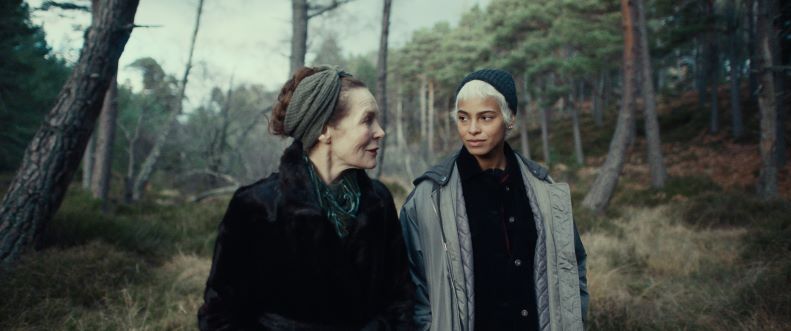![]() “Every mask has a function.” That’s what aging actress Veronica Ghent, a grand dame of the highest order, states in a voice-over as she applies her makeup. The mask she presents is one of haughty grandeur. It is both a mask and a wall. We meet her as she rides first-class in a train to the Scottish Highlands for a much-needed silent retreat: Veronica is recovering from a double mastectomy and also escaping the media: Eric Hathbourne (Malcolm McDowell), an iconic director, is making the sequel to film that launched Veronica to stardom at age 13. When watching the news, she is bombarded with images of young girls lining up to audition for the role that was once Veronica’s decades ago. She’s accompanied by her nurse, Desi (Kota Eberhardt), to whom she is curt and frosty.
“Every mask has a function.” That’s what aging actress Veronica Ghent, a grand dame of the highest order, states in a voice-over as she applies her makeup. The mask she presents is one of haughty grandeur. It is both a mask and a wall. We meet her as she rides first-class in a train to the Scottish Highlands for a much-needed silent retreat: Veronica is recovering from a double mastectomy and also escaping the media: Eric Hathbourne (Malcolm McDowell), an iconic director, is making the sequel to film that launched Veronica to stardom at age 13. When watching the news, she is bombarded with images of young girls lining up to audition for the role that was once Veronica’s decades ago. She’s accompanied by her nurse, Desi (Kota Eberhardt), to whom she is curt and frosty.
Once she arrives at an estate that could have popped out of a Daphne du Maurier novel, she discovers to her dismay that she will not be alone but surrounded by a group of eccentrics, led by artist Tirador (Rupert Everett). Walking across the peaty forest to her private cottage, Veronica and Desi pass a gravestone with the engraving “1722.” Their guide explains that it commemorates the last witch burning in the area. Desi remarks, “That’s creepy,” while Veronica admonishes her and intones, “It’s tragic.” Well, the witches seem to have heard Veronica, and strange things begin to occur. What and why they do, I will not reveal.
She Will starts off feeling like a classic gothic horror update and unexpectedly ends as a postfeminist revenge flick. The film works so well for its subtle subversion of genre tropes; its sly, winking sense of humor; a spot-on lead performance by Alice Krige, herself not a stranger to the horror genre (Ghost Story, Sleepwalkers), and the sure hand of director/co-writer Charlotte Colbert. The filmmaker clearly takes her cues from early gothic horror, and even though she sets her story in the modern world, it is jarring to see, say, a cell phone. She is obviously having fun with the idea of a Norma Desmond–type diva as the center of her story, and she knows the genre well enough to honor it while tweaking its nose and smoothly handling the shift in tone.
As such, the movie’s objective isn’t in producing scares, per se. There are no jump scares, like Psycho’s orchestral stings (though the score is very, very good). This is almost a slow burn satire, with a fiercely angry heart at its center. Gothic horror, in particular, matches hand in glove with the movie’s message of empowerment, given that the genre mostly relies on women. It also has a dreamlike quality, which the excellent cinematography by Jamie Ramsay captures beautifully, giving the film a richness to match its meaty subject. Crucially, Krige gives a master class in performance as she moves from a diva weakened by surgery into a more self-assured and comfortable version of herself. Of course, in order to become that, some people have to go, and let’s just say she gets some help.
She Will takes on some hefty themes: generational trauma, society’s marginalizing of women of a certain age, and the importance of sisterhood. Colbert handles these complicated themes with wit, humor, and heart. I heartily recommend this, particularly for genre enthusiasts.

















Leave A Comment